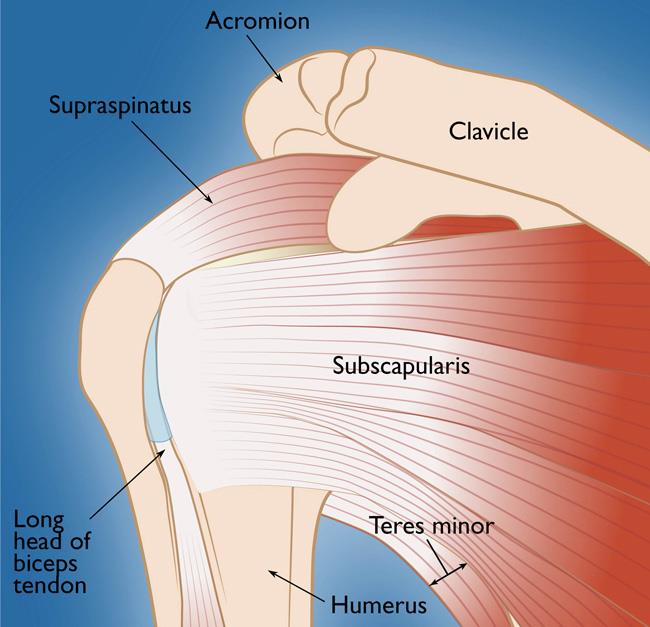Shoulder
Rotator Cuff Injury
The rotator cuff is a group of four muscles and tendons that stabilise the shoulder, allowing it to move freely while providing essential strength and control. These muscles—the supraspinatus, infraspinatus, teres minor, and subscapularis—work together to keep the humerus (upper arm bone) securely within the glenoid (shoulder socket). A rotator cuff injury, typically in the form of tendon tears, is a common cause of shoulder pain, particularly in individuals who are older or those involved in sports or physically demanding work.
What is a Rotator Cuff Tear?
A rotator cuff tear occurs when one or more of the rotator cuff tendons become torn, either partially or completely, from the humerus. The supraspinatus tendon is most commonly affected, but tears can involve other parts of the rotator cuff. Tears often start as fraying or minor damage, progressing to full-thickness tears over time, particularly in cases of degenerative damage due to repetitive stress or traumatic injury.
Types of Rotator Cuff Tears
- Traumatic Tears: These occur suddenly, often due to a fall, an accident, or a forceful lifting motion. Such injuries frequently cause large tears that may require surgical repair.
- Degenerative Tears: More common in older adults, these tears develop gradually as the tendon wears down. Degenerative tears may not initially cause pain but can become painful over time as the tendon frays and eventually tears completely.

Diagnosis of Rotator Cuff Injury
A rotator cuff tear is diagnosed through a combination of clinical examination and imaging tests. Dr. Ryan du Sart will assess the following during a physical examination:
- Range of motion: Testing for shoulder stiffness and pain when raising the arm.
- Weakness: Evaluating muscle strength in the shoulder.
- Pain on movement: Checking for pain while performing specific motions that stress the rotator cuff tendons.
Imaging is crucial for confirming the diagnosis:
- X-rays: X-rays can identify bone spurs or other structural issues in the shoulder joint but do not show soft tissue damage.
- MRI (Magnetic Resonance Imaging): MRI scans provide detailed images of the soft tissues, including the rotator cuff tendons, and can determine the size and extent of the tear.
- Ultrasound: This may be used in some cases to guide treatment and assess tendon damage.
Treatment Options for Rotator Cuff Injury
Treatment for rotator cuff tears depends on the size of the tear, the patient’s age, and their activity level. Options range from conservative (non-surgical) treatment to surgical intervention.
Non-Surgical (Conservative) Treatment
Small tears or tears that do not cause significant pain may not require surgery. Conservative management aims to reduce pain and improve function:
- Rest: Avoid activities that aggravate the injury, particularly overhead movements.
- Physical therapy: Strengthening the muscles around the shoulder and improving range of motion are essential. A physiotherapist will tailor a program to reduce pain and restore shoulder function.
- Medications: Pain relievers such as paracetamol or anti-inflammatory drugs (e.g., ibuprofen) can help manage pain and reduce swelling.
- Corticosteroid injections: These may be used to reduce inflammation and provide temporary pain relief.
- Shoulder bracing: In some cases, bracing may be recommended to protect the shoulder from further strain.
Surgical Treatment
If non-surgical treatment is ineffective, or if the tear is large, surgery may be necessary to repair the damaged tendon. Surgery for rotator cuff tears is typically performed arthroscopically, using small incisions and a camera to guide the procedure. The goal of surgery is to reattach the torn tendon to the humeral head. Options include:
- Rotator cuff repair: The torn tendon is reattached to the bone using sutures, anchors, or other fixation devices. Dr. du Sart prefers arthroscopic techniques due to their minimally invasive nature, resulting in less postoperative pain and quicker recovery times. Find out more about s
- Tendon grafts: In cases where the tendon is too damaged to repair, a tendon graft from the patient’s own body (autograft) or a donor tendon (allograft) may be used.
- Subacromial decompression: If impingement is contributing to the tear, this procedure involves removing part of the acromion to increase the space and reduce pressure on the rotator cuff.
Recovery and Rehabilitation
Recovery from rotator cuff surgery requires a rehabilitation program tailored to the severity of the injury. The rehabilitation process involves several stages:
- Post-operative care: After surgery, patients will wear a shoulder sling to protect the shoulder. Ice and elevation will help reduce swelling and discomfort.
- Physical therapy: A structured rehabilitation program will focus on restoring strength, range of motion, and flexibility. Exercises are gradually increased as the tendon heals.
- Return to activity: Depending on the severity of the injury and surgery, most patients can return to normal activities within 4 to 6 months. However, athletes and those engaging in high-demand activities may take longer to return to full function.
Why Choose Dr. Ryan du Sart?
Dr. Ryan du Sart is an orthopaedic surgeon with extensive experience in diagnosing and treating rotator cuff injuries. He offers a personalised approach to each patient, using the latest technology and surgical techniques to restore shoulder function and improve quality of life.
Book a Consultation
If you have experienced a shoulder injury or suspect a rotator cuff tear, early intervention is key to preventing further damage and ensuring a successful recovery. Schedule a consultation with Dr. Ryan du Sart to explore your treatment options and begin your journey to recovery.
Phone: (08) 9779 9767
Email:
admin@ryandusart.com.au
Clinic Locations:
6 Higgins Street, South Bunbury, WA 6230
20 Prince Street, Busselton, WA 6280
References:
- Buchbinder, R., et al. (2017). "Rotator cuff disease and shoulder impingement syndrome: Conservative management." Cochrane Database of Systematic Reviews.
- Cohen, S. P., et al. (2016). "Shoulder impingement syndrome and the management of rotator cuff disorders." Journal of Shoulder and Elbow Surgery, 25(4), 1-14.
- Madhav, R., et al. (2020). "Evaluation and management of shoulder impingement syndrome." The Journal of Bone and Joint Surgery, 102(2), 126-132.

